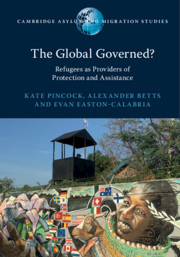2 - Theoretical Framework
Published online by Cambridge University Press: 06 March 2020
Summary
Our main theoretical contribution is the concept of the ‘global governed’, which we discuss as an umbrella concept for existing literatures on post-development, post-humanitarianism and post-protection. We also contribute ‘post-protection’, an analytical lens for critically engaging with the risks of protection as a form of top-down governance, and a means to recognise alternative forms of refugee-led social protection. This chapter presents these concepts and applies them to examine refugee-led social protection in East Africa. The ‘global governed’ enables us to ontologically focus on the collective action of refugees themselves, and the ways in which they mobilise to provide social protection. ‘Post-protection’ offers a heuristic framework through which to critically examine the interaction between top-down international institutions and bottom-up refugee community organisations (RCOs). Our main empirical question is: what explains variation in the scale and scope of refugee-led social protection? We seek to critically re-examine the provider-beneficiary relationship that characterises a range of policy fields, grounding our concepts in literatures that are fundamentally about the role of power in global governance. Our theoretical contributions critique the ‘global’ while rendering visible the ‘local’, highlighting hidden power relations and unquestioned institutional assumptions, while reasserting the subjectivity and agency of the marginalised.
Keywords
- Type
- Chapter
- Information
- The Global Governed?Refugees as Providers of Protection and Assistance, pp. 15 - 30Publisher: Cambridge University PressPrint publication year: 2020



